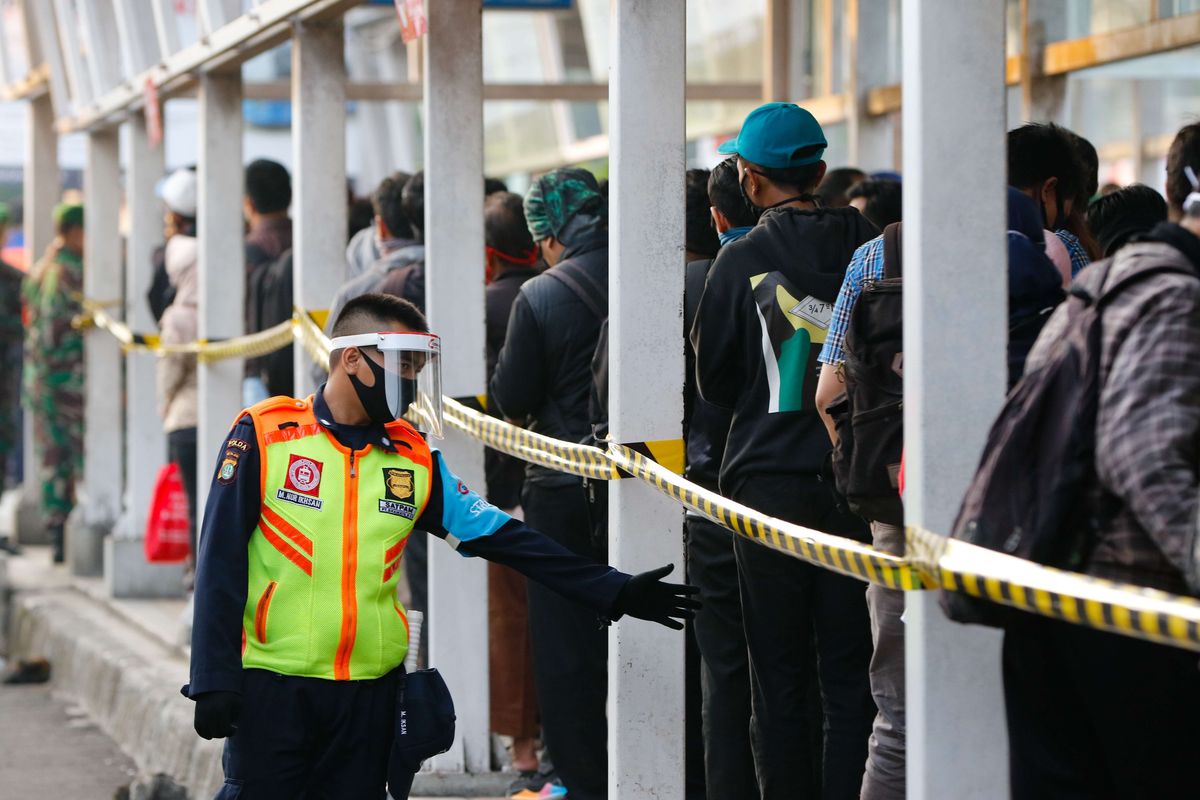COVID-19: Social Restrictions Extended, Violations Persist in Indonesian Cities

JAKARTA, KOMPAS.com - After two-month large-scale social restrictions, Indonesians across the country still get sanctioned for violating the rules amid growing coronavirus cases.
Following the country’s first two cases in early March, the government has stepped up its effort to curb the COVID-19 from spreading by imposing the large-scale social restrictions or locally known as PSBB.
The decision was then followed by the regional governments and local administrations throughout Indonesia, leading to restrictions on people’s movement and public gatherings.
Recently, Jakarta Governor Anies Baswedan has extended the PSBB in the Indonesian capital by another 14 days until June 4, bringing it the third time since he announced the first large-scale social restrictions on April 10.
“The Jakarta Administration and its task force would like to inform the public that PSBB in the city will be extended by 14 days starting from May 22 to June 4,” Anies said on Tuesday in a speech broadcast on the city’s YouTube channel.
He said that the next two weeks would become a crucial period in the effort to curb the transmission of COVID-19 in Jakarta. He stressed the importance of abiding by rules during PSBB. “This may become the last PSBB if we are being disciplined,” he said.
In Jakarta alone, the hardest-hit part of the country, as of today a total of 6.053 people have tested positive for COVID-19, over 1,400 people are recovered, and 487 have died.
Despite the rising numbers of confirmed cases, social restrictions have caused mixed reactions among the people. Some have been trying to abide by the rules by working from home, schooling from home, and have left the houses only if necessary.
However, others seemed to ignore the risk of getting infected by walking around in crowded public places such as wet markets.
Tania, 26, said that being at home at a time of PSBB could already cause a feeling of boredom. And, she added, it feels worse when sanctions on violators are not strictly imposed as seen on social media.
“Staying at home for three months would have been useless. I feel sorry for the healthcare workers [who have worked tirelessly],” she said.
Another Jakartan known as Harri, 25, shared a similar sentiment. He said that for almost three months he has been following the rules but he gets annoyed by some selfish people who evaded the PSBB.
But, he said that he will remain patient to follow the rules until the PSBB is revoked. “If so [PSBB will end], the government should impose stricter rules for the next two weeks,” Harri said.
Besides, they both also hoped that the local administration will maximize their efforts in distributing social assistances to low-income people in Jakarta as COVID-19 has a huge impact not only on people’s health but also on their economy.
Meanwhile, in Tangerang on the outskirts of the Indonesian capital, in two days alone this month more than 2,000 people have flouted the rules. Of these, over 1,700 people were forced to take rapid tests.
“The tests taken by some evaders show reactive results,” said Tangerang Regent Arief Wismansyah, referring to the 21 people whose results were reactive.
Apart from the rapid test, about 351 violators were sanctioned with community service such as cleaning the public areas and sweep the streets.
Arief said the relevant authorities will continue to monitor the public space and take necessary actions if violations occur, with the hope that people will realize the importance of maintaining their health by following the rules.
An official data recorded as of today 303 people in Tangerang have tested positive COVID-19, 26 people have died, 127 have been recovered, and 150 people are still being treated.
Elsewhere, in Dumai, Sumatra Province, street vendors and residents rejected the PSBB implementation on its first day on Monday. The incident, which went viral on social media, took place in the evening when hundreds of people gathered in a market on Jalan Jenderal Sudirman.
They disagree because they are only allowed to operate their businesses from around 6 pm to 9 pm while this week is the time to make good money as the Idul Fitri religious holiday celebrated by the Muslims around the world is approaching.
A resident who works at a workshop, Arya, 48, is among the people who rejected the social restrictions as many of his relatives are the street vendors. He said they need longer hours to sell food, clothes, and other products so that they can make a good income.
“Of course I am afraid of getting sick but we need to earn money to make a living. We will follow the recommended health protocol by wearing masks in public places and maintain physical distancing,” he said.
Indonesia, one of the hardest-hit countries, has the highest mortality rate in Southeast Asia, reaching between 8-9 percent.
The death toll from coronavirus has hit over 1,200. As of Thursday, the authorities have confirmed 20,162 COVID-19 positive cases and 4,838 have been recovered throughout Indonesia. (Author: Rakhmat Nur Hakim, Idon Tanjung, Singgih Wiryono, Jimmy Ramadhan Azhari | Editor: )
Simak breaking news dan berita pilihan kami langsung di ponselmu. Pilih saluran andalanmu akses berita Kompas.com WhatsApp Channel : https://www.whatsapp.com/channel/0029VaFPbedBPzjZrk13HO3D. Pastikan kamu sudah install aplikasi WhatsApp ya.































